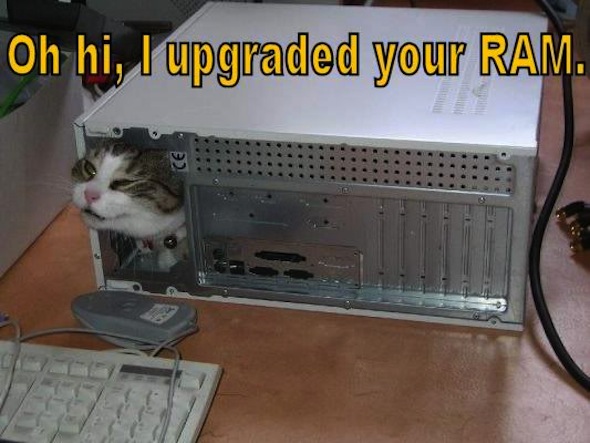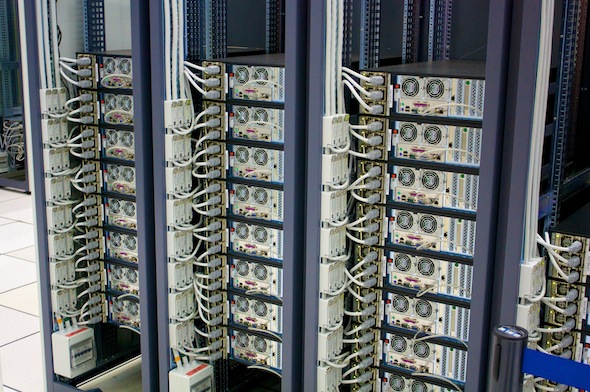How to know when to upgrade your web server

I am going to help you with your mouse problem too.
If you have a website, a portfolio, a blog, a business, a Facebook app, or some kind of community forum, chances are you have a web server. While you could used shared services like Blogger.com, Tumblr, GeoCities (remember GeoCities?) or WordPress.com, when you want that custom experience, that unique vibe, you gotta use your own server.
Recently at electrokami.com, we upgraded our server to a dedicated virtual server from Media Temple, something like a virtual private server (VPS). Needless to say, the jump in performance was massive!
But we didn’t upgrade on a whim, it took time for us to think about why and how we should upgrade the server. Here are some reasons to upgrade your web server.
It loads slowly
This one seems like a no-brainer, but you have to take a closer look at the qualifiers. Here is a list of questions to ask when it comes to upgrading your server, using ours as an example response.
- Is it slow because the hosting company is slow?
- (no – and if it is then find a new host)
- Is it slow because you have multiple sites on the same server?
- (yes – and most of them are complex PHP and MySQL sites or apps)
- Is there a blog on your server?
- (yes – two actually, both getting quite a bit of traffic each day)
- Is the programming on the website optimized?
- (yes – always make sure that slow load times are not due to bugs or unoptimized code)
- Are your assets optimized?
- (yes – we always optimize our CSS, JS, Flash, and images to ensure speedy load times)
You ran out of server space
Depending on the type of website you have and what it does, space is a precious, precious commodity. Whether it be hard drive space for all of your images and other assets, or database size, you may soon hit a wall where your content outweighs your capacity. When that day comes, it might mean you should upgrade your server.
Likewise, if you are hosting several sites and find that space is slowly diminishing, consider removing or reallocating space from sites that don’t need as much (like a text heavy website) and giving it to sites that do (like a portfolio or blog).
One or more of your sites hit the bandwidth limit
This one should be an easy decision too. If you have a very popular blog, a heavily trafficked wiki site, a digital download service, or a high-profile app, then you are also getting a ton of visitors and users and therefore are probably tapping your bandwidth limit.
Not only do some web server companies ding you financially for every overage of traffic, your site might get shutdown or even suspended!
Now don’t go and buy a heavy duty bandwidth plan for your server just yet though, you can also try getting a content delivery network to lighten the load, or consider using a download service like BitTorrent to aid in transferring large files to your users.
If the costs of using a content delivery network (CDN) outweigh the purchase of an upgraded server or higher bandwidth allocation, then do some more research on both.
You’re on a shared server with too much downtime

Shared server room. Like the Matrix pods for computers.
Shared hosting is a dangerous thing for some – it looks cheap up front, but some server hosting companies can load on up to 1000 different websites on one server!
When your website goes down and you just paid for ads on Google, Yahoo, or Facebook, what are you going to do? What can you do? If you have shared hosting (and most people do), then you usually get what you paid for – which isn’t much!
Hopefully if you are hosting with something more along the lines of a grid-based server, you will at least be able to load the page. But on a lot of shared hosts, when another user’s site has tons of unexpected traffic, it usually takes down the whole thing, meaning your site gets punished for other’s peaks in traffic.
Most shared-hosting companies will charge the person who goes over their cap and stalls the server, but that still doesn’t bring back your site when you need it most. If you are planning to purchase ads digitally or in print advertising, make sure that your website will be online and load quickly when people come to see it!
Conclusion
When it comes down to the decision, upgrading a server costs money, may cost time (to transfer files and databases), and may not even solve the problem (if your code isn’t optimized or your hosting company is busted).
Take time to consider all of the possibilities of why your website is slow before getting the upgrade.
Other then that, good luck!
